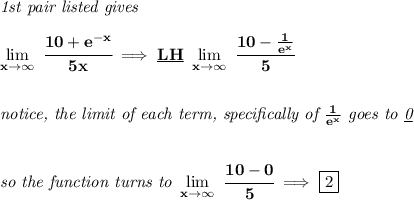
Mathematics, 17.09.2019 16:20 krlx
For which pair of functions f(x) and g(x) below will the limit as x goes to infinity of the product of f of x and g of x does not equal 0?
f(x) = 10x + e−x; g(x) =1 divided by the quantity 5 times x
f(x) = x2; g(x) = e−4x
f(x) =(lnx)3; g(x) =1 divided by x
f(x) =square root of x; g(x) = e−x


Answers: 2
Another question on Mathematics

Mathematics, 21.06.2019 18:30
Dakota earned $7.50 in interest in account a and $18.75 in interest in account b after 15 months. if the simple interest rate is 4% for account a and 5% for account b, which account has the greater principal? explain. to make it a little easier, there is an image. good luck!
Answers: 1

Mathematics, 21.06.2019 19:50
The graph shows the distance kerri drives on a trip. what is kerri's speed . a. 25 b.75 c.60 d.50
Answers: 1

Mathematics, 21.06.2019 23:00
Apackage of orgainc strwberries costs $1.50 while there in season and $2.25 when not in season what the percent increase
Answers: 1

Mathematics, 22.06.2019 00:00
Which is a logical conclusion based on the given information? a. figure abcd is a rhombus by the definition of a rhombus. b. segment ac is congruent to segment dc by cpctc. c. angle acb is congruent to angle adc by the angle-side-angle theorem. d. triangle acd is congruent to triangle cab by the hypotenuse-leg theorem.
Answers: 1
You know the right answer?
For which pair of functions f(x) and g(x) below will the limit as x goes to infinity of the product...
Questions

Computers and Technology, 09.04.2021 20:30

Mathematics, 09.04.2021 20:30



Mathematics, 09.04.2021 20:30


Mathematics, 09.04.2021 20:30

Mathematics, 09.04.2021 20:30


Mathematics, 09.04.2021 20:30

Mathematics, 09.04.2021 20:30

Mathematics, 09.04.2021 20:30




Mathematics, 09.04.2021 20:30

French, 09.04.2021 20:30


English, 09.04.2021 20:30

Mathematics, 09.04.2021 20:30


![\bf \textit{3rd pair listed gives }\\\\ \lim\limits_{x\to \infty}\ \cfrac{[ln(x)]^3}{x}\implies \underline{LH}\ \lim\limits_{x\to \infty}\ \cfrac{3ln(x)\cfrac{1}{x}}{1}\implies \lim\limits_{x\to \infty}\ \cfrac{3ln(x)}{x}](/tpl/images/0236/7747/c2def.png)




